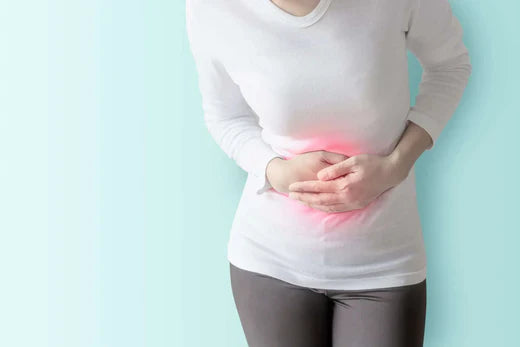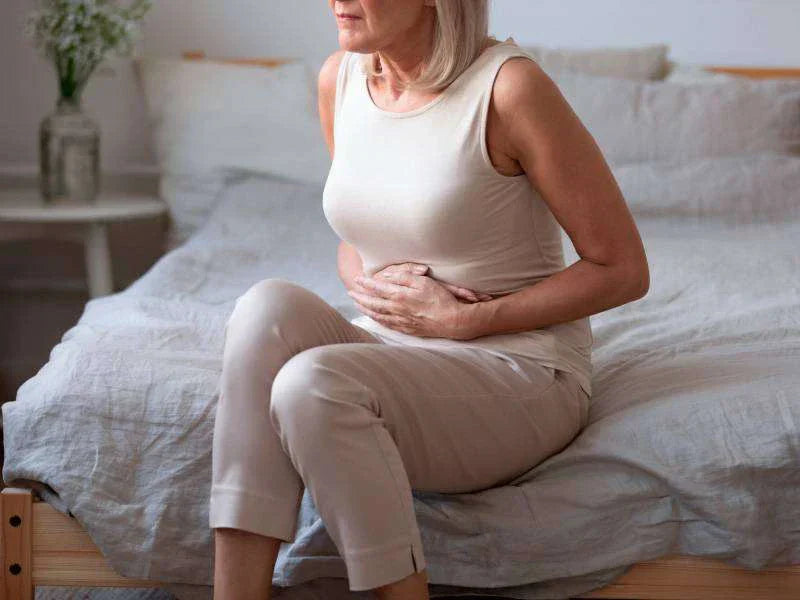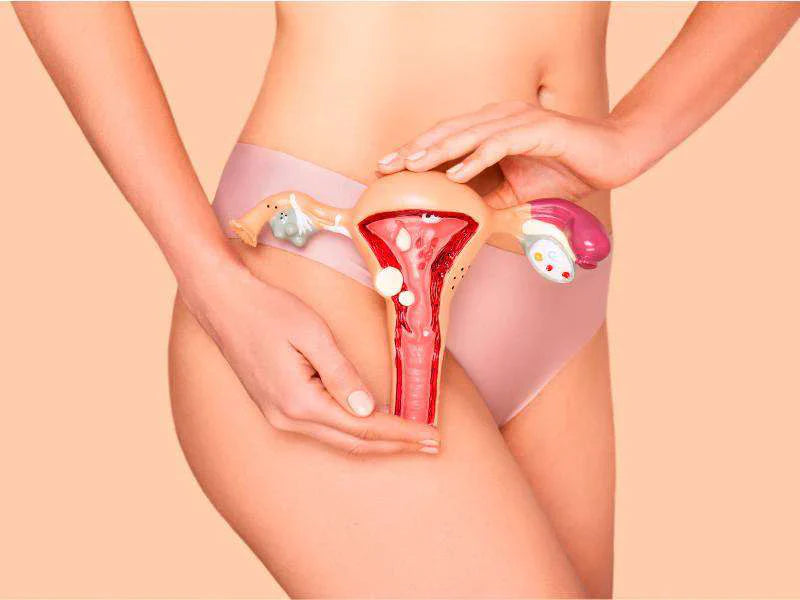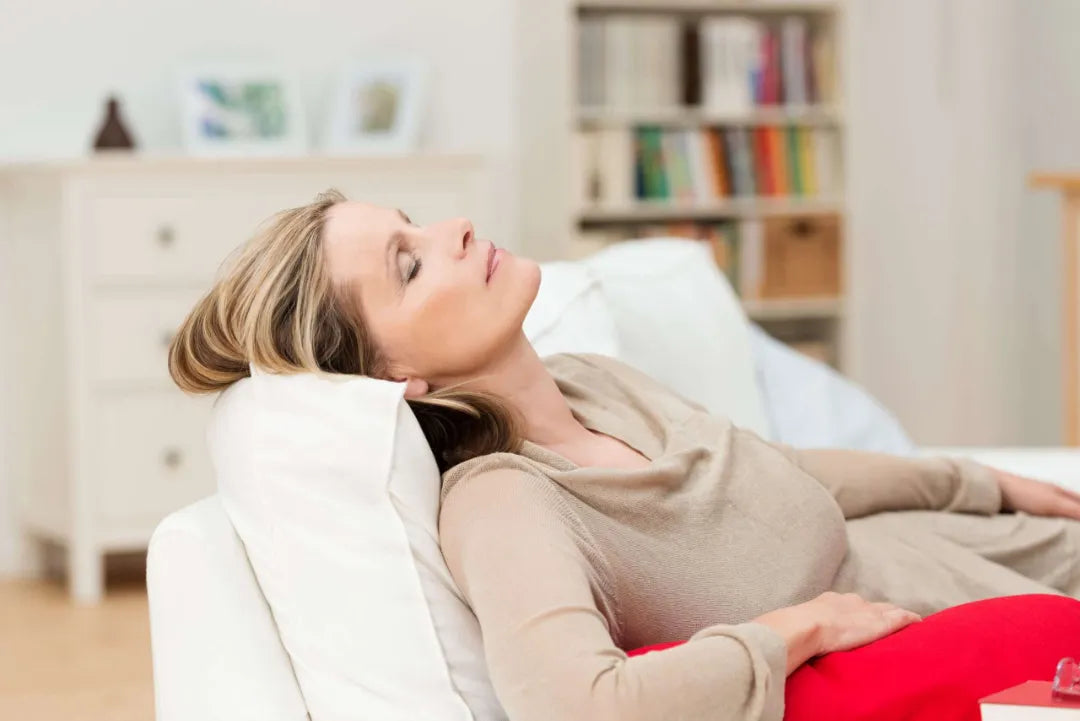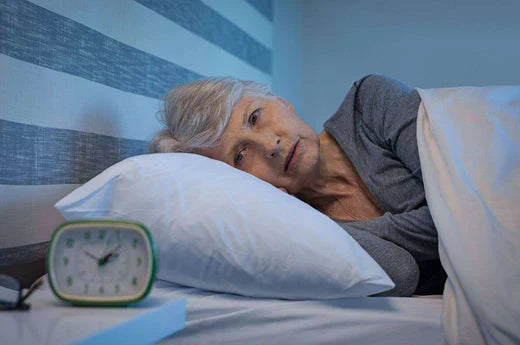Women can experience different symptoms in menopause, as it is a time when many physical changes take place. Some are mild, and others are more troublesome (did you know that one in 10 women experience them for up to 12 years?). The symptoms range from alterations in the menstrual cycle, hot flushes, vaginal dryness to discomfort caused by changes in hormonal levels such as abdominal pain, heart palpitations, and headaches (NIA, 2021; Huizen, 2020). Among the changes experienced during menopause, we see problems arise in the digestive system such as intestinal discomfort, bloating, gas, constipation, diarrheoa, nausea, and vomiting, among other problems. (Instituto de la Menopausia, n.d.; Menopause Now, 2020). Bloating is a condition in which the abdomen feels full and tight. It is characterised by a visible increase in the size of the stomach due to fluid retention, which causes abdominal pain. Menopause also slows down metobolism This leads to slower digestions that, in turn, leads to bloating (Instituto de la Menopausia, s.f.; Mayo Clinic, 2020).

Causes of abdominal pain during menopause
As a woman’s body prepares to end her fertile stage, she experiences different hormonal changes that can affect the digestive system and cause abdominal pain. At menopause, estrogen and progesterone production fluctuate and gradually decline, and both hormones regulate the functions of the digestive system (Menopause Now, 2020). These problems in the digestive system occur because estrogen has a direct impact on cortisol (a hormone that regulates metabolism and immune response). When estrogen production is low, cortisol rises and causes an increase in blood pressure and blood sugar levels (Winona, 2022). Over time, the release of stomach acid and the movement of the food bolus into the small intestine slows down. This can lead to digestive problems such as bloating, gas, and constipation (Menopause Now, 2020). These are the most common causes of abdominal pain during menopause: Abdominal bloating Bloating is a condition in which the abdomen feels full and tight. It is characterised by a visible increase in the size of the stomach due to fluid retention, which causes abdominal pain. Menopause also slows down metabolism. This leads to slower digestion that, in turn, leads to bloating (Instituto de la Menopausia, s.f.; Mayo Clinic, 2020).
Constipation
Constipation is a condition in which a person may have fewer than three bowel movements a week. This can cause abdominal pain, making the evacuation of the intestine difficult or painful. Constipation is common as a woman ages and becomes menopausal due to slow digestion. Constipation is also common in those women with gastrointestinal disorders such as irritable bowel syndrome (NIDDK, 2018).
Indigestion
Indigestion or dyspepsia is a condition that causes abdominal pain, often after eating or drinking. It is a digestive problem that can lead to bloating, gas, a burning sensation in the digestive tract, nausea, and vomiting. It happens due to many health conditions, including menopause, because of metabolic changes in this period. Still, it can also be related to obesity, gastritis, irritable bowel syndrome, and other conditions (Newman, 2020).
Stomach cramps
Cramping is a type of abdominal pain that usually starts and ends suddenly, and it is often intense and comes in waves. It can be mainly caused by kidney gallstones, but it can also occur because of constipation, indigestion, bloating, and other symptoms in menopause (MedlinePlus, 2020).
Diarrhea
Diarrhoea is loose, liquid and frequent stools that can occur alone or be associated with other symptoms. These include nausea and vomiting, stomach pain, or weight loss. It can appear during menopause because the hormonal imbalance affects the intestinal flora. It usually lasts a few days, but when it lasts for weeks, it indicates that there is another problem such as irritable bowel syndrome or inflammatory bowel disease (Mayo Clinic, 2021).
Flatulence
Flatulence or accumulation of gases in the intestines is caused by indigestion caused by food. Gases can appear when the digestive system does not break down some parts of food such as gluten or sugar. It also occurs with the hormonal changes of menopause, since low estrogen levels do not allow the digestive system to function properly (Instituto de la Menopausia, n.d.; Mayo Clinic, 2020).
Signs and symptoms that you should not ignore
Abdominal pain occurring in menopause due to digestive problems can be resolved with simple changes in your lifestyle; for example, you should avoid food that irritates your digestive system. However, you also should seek medical attention if abdominal pain does not improve with over the counter or natural medication. Especially if you experience alarm symptoms such as the following (Instituto de la Menopausia, n.d.; Mayo Clinic, 2020):
- Persistent or severe abdominal pain.
- Changes in bathroom habits.
- Bloody stools and changes in stool colour or frequency.
- Unintentional weight loss.
- Chest discomfort.
- Loss of appetite or feeling full quickly.
Abdominal pain appears during menopause due to digestive problems. Some measures can help alleviate these discomforts, such as changes in your lifestyle. We invite you to follow healthy habits such as eating enough fibre, sleeping well, drinking plenty of fluids, and exercising which can help relieve pain. However, it is vital to seek medical attention if you experience any of the alarm symptoms noted above.
Bibliography
-
Huizen, J. (2020, 13 de enero). Todo lo que debe saber sobre la menopausia. Healthline. https://www.healthline.com/health/menopause
-
Instituto de la Menopausia. (s.f.). Menopausia y problemas digestivos. https://www.institutodelamenopausia.com/divulgacion/sintomas/menopausia-y-problemas-digestivos - Instituto Nacional sobre el Envejecimiento de los NIH [NIA]. (2021, 30 de septiembre). ¿Qué es la menopausia? https://www.nia.nih.gov/health/what-menopause#symptoms
- Instituto Nacional de la Diabetes y las Enfermedades Digestivas y Renales [NIDDK]. (2018). Síntomas y causas del estreñimiento. https://www.niddk.nih.gov/health-information/informacion-de-la-salud/enfermedades-digestivas/estrenimiento/sintomas-y-causas
- Mayo Clinic. (2020, 13 de febrero). Eructos, gases e hinchazón: consejos para reducirlos. https://www.mayoclinic.org/es-es/diseases-conditions/gas-and-gas-pains/in-depth/gas-and-gas-pains/art-20044739
- Mayo Clinic. (2021, 18 de agosto). Diarrea. https://www.mayoclinic.org/es-es/diseases-conditions/diarrhea/symptoms-causes/syc-20352241
- MedlinePlus. (2020, 15 de enero). Dolor abdominal. https://medlineplus.gov/spanish/ency/article/003120.htm
- Menopause Now. (2020, 15 de julio). Problemas digestivos. https://www.menopausenow.com/es/problemas-digestivos
- Menopause Now. (2019, 30 de abril). 6 consejos para aliviar problemas digestivos en la menopausia. https://www.menopausenow.com/es/problemas-digestivos/articulos/6-consejos-para-aliviar-problemas-digestivos-en-la-menopausia
- Newman, T. (2020, 21 de octubre). Qué saber sobre la indigestión o la dispepsia. Medical News Today. https://www.medicalnewstoday.com/articles/163484#_noHeaderPrefixedContent
You May Also Like

JOIN US AND GET 10% OFF
Sign up to our newsletter to access free resources, advice and support.



